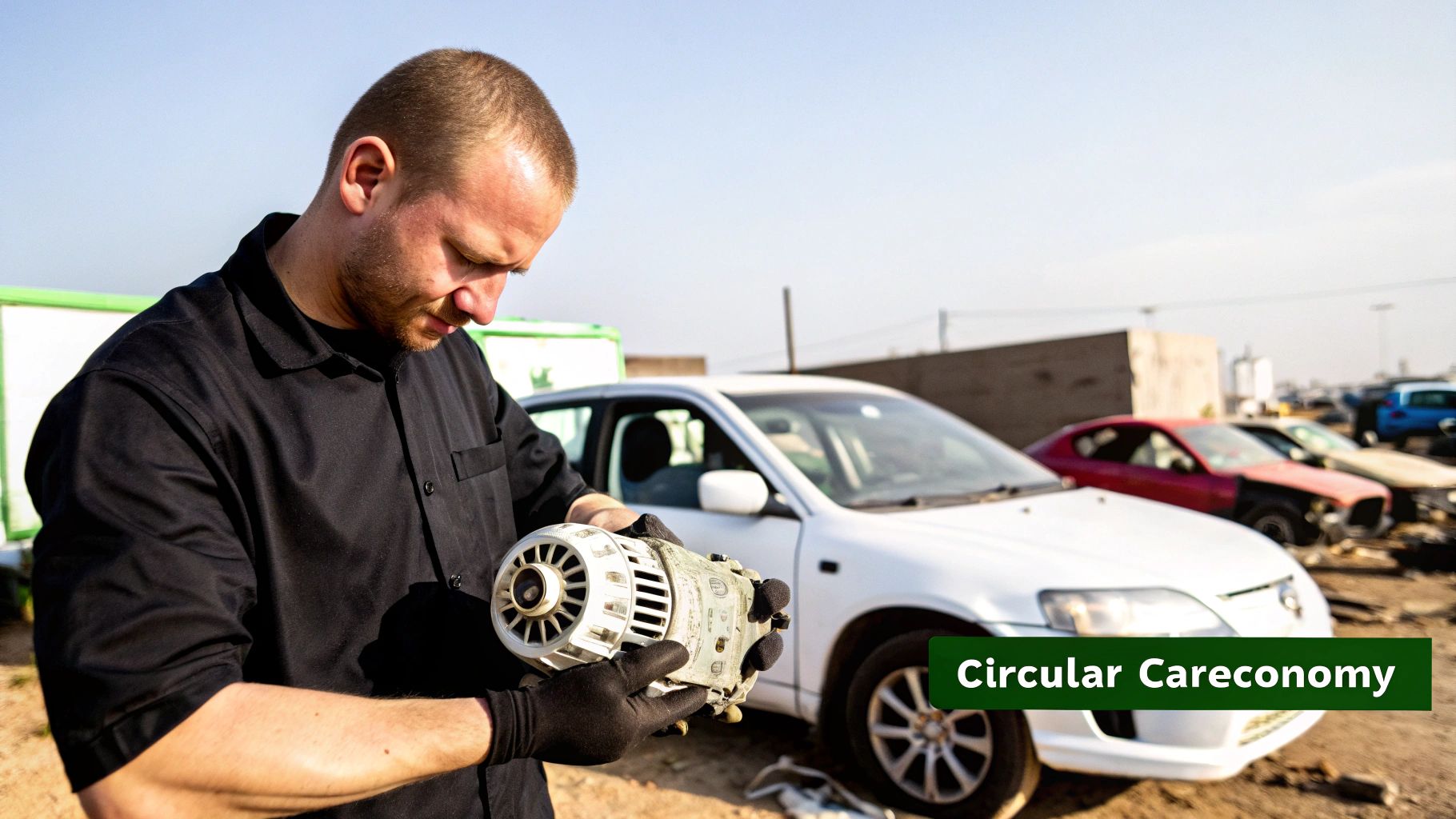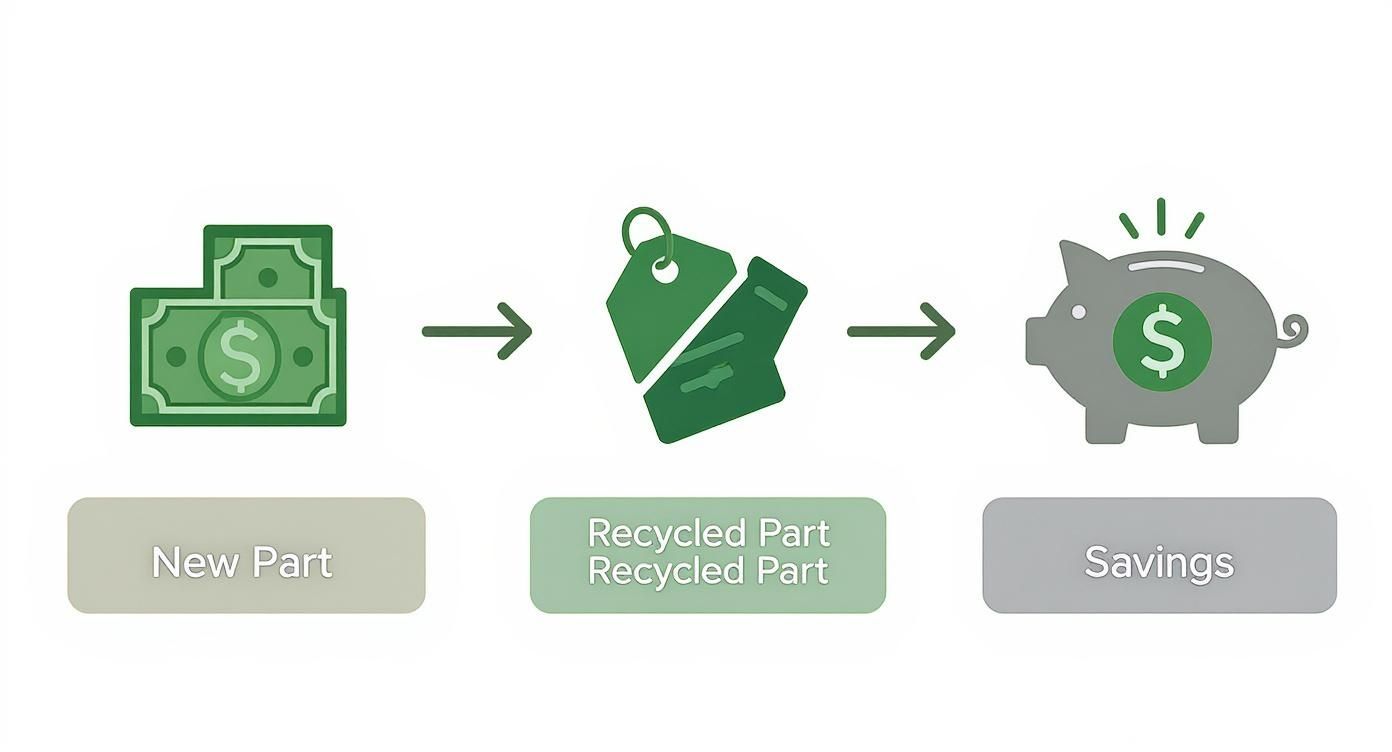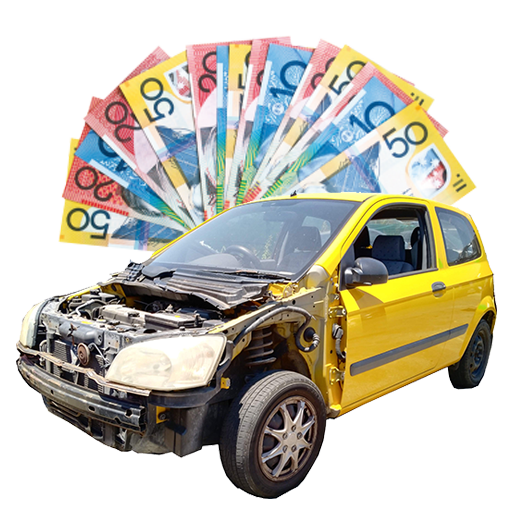When a car finally reaches the end of the road, what happens to it? It's easy to picture a rusty heap in a scrapyard, but that's an outdated image. The modern approach is far more sophisticated: car parts recycling.
Essentially, it’s the process of carefully dismantling old vehicles to salvage every useful component and material. Think of it less as a graveyard and more as an organ donor program for cars, where a retired vehicle's parts get a second chance to keep another one running. This is the heart of a circular economy in the automotive world.
Why Car Parts Recycling Matters More Than Ever

The scale of automotive waste in Australia is staggering. Every year, around 850,000 vehicles are taken off the road, creating a mountain of roughly 1.36 million tonnes of scrap. The confronting reality is that we only manage to recycle about 70–75% of this material. The rest—a massive amount of metal, plastic, and glass—ends up in landfill.
This is why flipping the script from a "use and toss" model to a circular one is so critical. Instead of a one-way trip from the factory floor to the scrap heap, car parts recycling creates a sustainable loop.
An old car isn’t just junk. It's a treasure trove of resources. Its engine, transmission, alternator, and even body panels can all be carefully removed, tested, and put back into service, keeping another vehicle on the road.
This smarter approach is a win-win, benefiting our wallets and the planet. The ripple effects of automotive parts recycling are huge, making it one of the most intelligent environmental and economic choices we can make.
The Core Benefits of Recycling Car Parts
Diving into this process unlocks some pretty significant advantages that we'll explore in this guide:
- Environmental Conservation: It dramatically cuts down the demand for new raw materials. Mining for iron ore or producing aluminium from scratch is incredibly energy-intensive and damaging to natural landscapes. Recycling skips that whole destructive process.
- Resource Preservation: It keeps valuable, perfectly good materials in circulation. Why bury steel, aluminium, and durable plastics in the ground when they can be used again and again?
- Significant Cost Savings: For mechanics and car owners alike, recycled parts are a game-changer. You get a reliable, OEM-quality component for a fraction of what you'd pay for a brand-new one.
How Recycled Auto Parts Save You Money
Sure, the environmental angle is a big win, but let's be honest—the most powerful reason for most people to choose recycled parts is the massive dent it can put in your repair bills. We're not talking about a small discount here. This is a completely different way to manage your car's upkeep, one that can lead to some seriously significant savings.
The logic behind the lower cost is pretty straightforward. You're completely sidestepping the manufacturing cycle. Think about what it takes to make a new part: mining raw materials, firing up energy-hungry factories, shipping it across the globe, and marketing it. All those costs get baked into the final price tag. A recycled part, on the other hand, is already here. The main costs are the expert labour to dismantle, test, and stock the part, which is a far leaner process.
Where You Save the Most
While pretty much any used part will be easier on the wallet, the savings get really eye-watering when you're looking at major components. These are the big-ticket items that can turn a manageable repair into a financial nightmare, often deciding whether a car gets fixed or sent to the scrap heap.
You’ll see the biggest savings on parts like:
- Engines and Transmissions: As the heart and soul of your vehicle, these are by far the most expensive components to replace. Sourcing a recycled, low-kilometre engine or transmission can be 50-75% cheaper than buying new, putting thousands of dollars back in your pocket.
- Alternators and Starter Motors: These crucial parts are common wear-and-tear items. A quality-tested recycled unit will do the exact same job as a new one, just for a fraction of the price.
- Body Panels and Bumpers: Even a minor bingle can lead to shocking quotes for cosmetic repairs. Finding a door, bonnet, or bumper in the right colour from a recycler is a brilliant way to get your car looking sharp again without paying for brand-new panels and a costly paint job.
The financial potential here for Aussies is massive. In fact, recent research shows that Australian drivers could save a collective $15.5 billion over five years by opting for recycled parts. That breaks down to about $2,144 per driver, a figure driven by the fact that used parts can be up to 85% cheaper than their brand-new counterparts. If you want to dive into the numbers, you can explore the research on Aussie driver savings.
Quality You Can Trust
One of the biggest hang-ups people have is worrying that a lower price means lower quality. When you're dealing with a professional auto recycler, that’s simply not the case. We don't just yank parts out of a wreck and throw them on a shelf.
Every single component we salvage goes through a rigorous process. It’s carefully inspected, cleaned, and tested to ensure it works perfectly. Our technicians then grade each part based on its condition, so you have total transparency about what you’re buying.
This professional standard means that when you buy recycled auto parts, you’re getting a genuine, reliable component you can depend on. Many reputable recyclers, including us, stand behind our parts with a warranty. It’s our way of showing you we’re confident in what we sell, making it a smart financial decision that doesn't force you to gamble on quality.
The Journey from Scrap Car to Reusable Part
Ever wondered what really happens to your old car after you hand over the keys to a recycler? It’s far more sophisticated than just a giant crusher turning it into a metal cube. Think of it as a highly organised, surgical procedure designed to salvage every last bit of value and give countless parts a second life.
This whole system is a brilliant example of efficiency and environmental care working hand-in-hand. From the moment a car rolls into a professional facility like ours, it enters a structured process where skilled technicians follow a precise game plan. Let’s pull back the curtain and see how it works.
Step 1: Depollution and Fluid Removal
First things first, the car has to be made safe. Before a single bolt is turned, it undergoes a critical process called depollution. This is where all the potentially hazardous fluids are meticulously drained to make sure nothing nasty contaminates the environment. We're talking about more than just a quick oil change.
Technicians methodically remove a whole cocktail of liquids:
- Engine oil and transmission fluid
- Coolant and antifreeze
- Brake and power steering fluids
- Any leftover petrol or diesel
- Even the refrigerant from the air conditioning system is safely captured.
These fluids are then funnelled into specialised containers for proper recycling or disposal, ensuring they never have a chance to harm soil or waterways.
Step 2: Meticulous Dismantling
With the vehicle now safe and dry, the real treasure hunt begins. This is where technicians become surgeons, carefully disassembling the car to rescue every component that can be used again. It's a precise operation, not a chaotic tear-down.
They focus on high-demand, reliable parts like engines, transmissions, alternators, and starter motors. They also save valuable body panels—think doors, bonnets, and guards that are in good nick. Every single part that’s deemed reusable is carefully set aside for the next stage.
Step 3: Inspection and Quality Testing
A salvaged part is worthless if it doesn't work. That's why every single component we pull goes through a tough inspection and testing process to ensure it meets our quality standards. It's our way of making sure you get a part you can rely on.
An engine, for instance, might be put through a compression test, while an alternator is checked to ensure it's still putting out the right voltage.
This quality control step is non-negotiable. It’s what separates a professional auto recycler from a basic scrapyard and gives you the peace of mind that a used part can perform just as well as a brand-new one.
Step 4: Cleaning and Reconditioning
Once a part gets the green light, it’s time for a proper clean-up. Each component is professionally detailed to strip away all the grime, oil, and dirt it’s collected over the years. Some parts might also get a little extra attention—some minor reconditioning—to bring them back as close as possible to factory specs.
This isn’t just about making them look good; it ensures they're ready for immediate installation when you need them.
Step 5: Cataloguing and Warehousing
The final step is all about organisation. Every cleaned, tested, and approved part is given a unique ID number, entered into our digital inventory system, and neatly stored in our warehouse. This meticulous system means when you call asking for a specific part, we can find it in a flash.
The infographic below shows how this careful, step-by-step process translates directly into significant savings for you.

This journey from a tired, old vehicle to a shelf full of quality parts really shows the incredible value locked inside every car that reaches the end of its road.
The Environmental Impact of Your Choice
Choosing a recycled car part isn't just a smart move for your wallet; it's a powerful vote for a healthier planet. Every time a used component gets a second life instead of a new one being made, it sends positive ripples across the environment, reducing strain on our natural world in ways you might not expect.
Think about what it takes to make a new part from scratch. It’s an incredibly thirsty and energy-hungry process. It all starts with mining raw materials like iron ore and bauxite, which chews through fossil fuels and water while leaving scars on the landscape. Then comes the smelting, refining, and factory production—each step adding to the environmental cost.
By embracing car parts recycling, we get to sidestep that entire destructive chain.
Conserving Precious Natural Resources
When you grab a recycled alternator or bumper, you are directly stopping the need to dig up and process more raw materials. The conservation impact is huge, especially when you look at the main metals that go into building a car.
- Steel Savings: Did you know that recycling steel uses roughly 74% less energy than making it from raw iron ore? That massive energy saving also means a big drop in related air and water pollution.
- Aluminium Advantage: The numbers for aluminium are even more stunning. Creating recycled aluminium needs up to 95% less energy than producing it from virgin materials.
This is what keeping resources in the loop is all about. It means fewer mines, less deforestation, and a much smaller industrial footprint on our planet. We get to treat these valuable materials like the finite resources they actually are.
Every reused car part is a victory for the circular economy. It’s a tangible piece of a system where we reduce consumption, minimise waste, and make the most of what we already have.
Reducing Landfill Burden and Carbon Emissions
One of the most obvious wins from car parts recycling is how much less we send to the tip. Hundreds of thousands of cars are taken off Australian roads every year. Salvaging their components diverts millions of tonnes of metal, plastic, and glass that would otherwise just be buried in the ground.
This also shrinks our collective carbon footprint. All that energy saved by not manufacturing new parts translates into a massive reduction in greenhouse gas emissions. Fewer factory smokestacks and mining operations mean cleaner air for everyone. Your simple choice to buy a used part helps in the fight against climate change, proving that small, individual actions really can add up to create a significant, positive shift. It’s a practical way to make a real difference.
How to Responsibly Recycle Your Old Car

It's one thing to understand why recycling car parts is a great idea, but how do you actually get your old clunker into the system? The good news is, it's far simpler than you might think, especially when you work with a professional service that handles all the details.
Forget about the old days of dealing with complicated logistics or worrying about hidden costs. Modern auto recyclers have refined the entire process, making it a smooth, convenient, and often profitable journey from your driveway to the dismantling yard. The whole point is to make it incredibly easy for you to do the right thing.
Your Simple Four-Step Process
When you partner with a trusted team like Auto Removal Adelaide, turning that old vehicle into cash and recycled materials is a breeze. You won’t have to lift a finger for transport, paperwork, or haggling—we take care of it all.
Here’s a quick look at how it all comes together:
-
Get Your Free Quote: First things first, get in touch with us for a free, no-obligation quote. Just share a few basic details about your car, and we'll calculate a competitive offer based on its make, model, and overall condition.
-
Accept the Fair Offer: We pride ourselves on making fair and transparent offers. Once you're happy with the price and give us the green light, we can lock in a pickup time that suits your schedule.
-
Schedule Free Vehicle Pickup: That's right—we offer a free towing service anywhere in Adelaide. You pick the time and place, whether it's your home, workplace, or mechanic's shop, and our crew will be there.
-
Receive Instant Payment: You get paid on the spot. When our team arrives to collect your car, they'll hand you the cash right then and there. No waiting around for a cheque to clear or dealing with bank transfer delays.
This entire system is built around your convenience. We believe that responsible car recycling should be accessible to everyone, which is why we handle all the heavy lifting and logistical headaches from start to finish.
This straightforward approach means the proper disposal of cars isn't just a win for the environment; it’s also a simple and profitable way for you to clear out some space. It’s the easiest way to get paid for your old car and contribute to a more sustainable automotive industry.
Common Questions About Car Parts Recycling
Thinking about using recycled car parts? It's a smart move, but it's natural to have a few questions, especially if you're doing it for the first time. Let's walk through some of the most common queries to clear things up.
Are Recycled Car Parts Safe to Use?
Absolutely, but there's a big "if"—if you get them from a reputable auto recycler. Professional operators don't just rip a part out of a wreck and stick it on a shelf. Far from it. Each component goes through a serious process: it's carefully inspected, thoroughly cleaned, and put through its paces with quality testing to make sure it meets strict safety and performance standards.
For the pros, this isn't just a suggestion; it's the only way they do business. This detailed quality control is what gives you the confidence that a recycled alternator, door panel, or even a full transmission will work just as it should once it's in your car.
Here's something to think about: a professionally salvaged and tested Original Equipment Manufacturer (OEM) part is often a much safer bet than a cheap, brand-new aftermarket part made by an unknown company. You're getting genuine factory quality without the eye-watering price tag.
What Kind of Warranty Can I Expect?
That's a fantastic question, and the answer really separates the professionals from the backyard operators. Warranties will differ depending on the recycler and the specific part, but any established business worth its salt will stand behind what they sell. You'll find that reputable sellers almost always offer a warranty period to give you proper peace of mind.
This warranty is your safety net. It protects you if the part is faulty or doesn't perform as expected. Always make sure you ask about the warranty details before you hand over any money—it’s a dead giveaway of how confident a recycler is in their own quality control.
Which Parts Are Most Commonly Recycled?
While you can salvage a massive range of components from a single vehicle, some parts are always in high demand. This is usually because they are expensive to buy new or are common failure points.
- Engines and Transmissions: These are the heavy hitters. As the most complex and expensive components to replace, high-quality used ones are always sought after.
- Alternators, Starter Motors, and AC Compressors: These workhorses of your car often wear out. A recycled unit is a popular and very cost-effective solution.
- Body Panels: Doors, bonnets, guards, and bumpers are frequently needed for smash repairs. A salvaged panel in good condition can save you a fortune.
- Wheels and Tyres: A set of alloy wheels in good nick or tyres with plenty of life left in them are always easy to find a new home for.
How Do I Find a Reputable Car Recycler?
Your best bet is to look for businesses with a solid local reputation, straightforward processes, and transparent pricing. A trustworthy recycler runs a clean, organised yard, offers a clear warranty on their parts, and has staff who are happy to help. A quick search for online reviews is always a good idea, and sticking with licensed, established yards ensures you’re dealing with professionals who put quality and safety first.
Ready to see your old car contribute to this circular economy? Contact Auto Removal Adelaide today for a free, no-obligation quote. We make it easy to turn your unwanted vehicle into cash with our simple, hassle-free removal service. Visit us at https://autoremovaladelaide.com.au to learn more.


